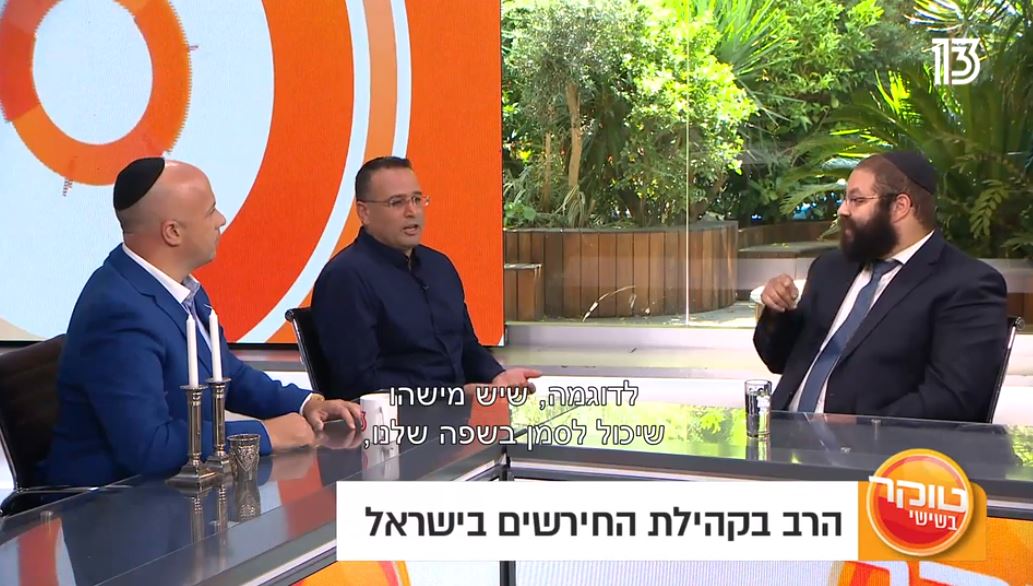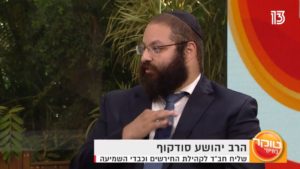[Mr. Toker]
Toker on Friday: Sitting with me is Abigail Dagan Haddad.
We will hear about your blessed initiative soon, but we are starting with the International Day of the Deaf, which is coming up and commemorated on October 4th. And with us here is Rabbi Yehoshua Soudakoff, who is a Chabad emissary for the Deaf community, and Deaf himself. Sami Siroha will translate to us from sign language, thank you for coming here. How are you?
[Rabbi Soudakoff]
Thank God.
[Mr. Toker]
Thank you. What is so special about the Chabad House for the Deaf? What is there?
[Rabbi Soudakoff]
Chabad House for the Deaf is accessible to all deaf people in our entire community. It is something that was missing to this day. I will tell you what “accessible” means.
[Mr. Toker]
Yes
[Rabbi Soudakoff]
For example, there is someone who can sign in our language, someone that can explain to us, through the people who are deaf themselves that are our role models. Deaf people who can be part of the community of Judaism. This means that they can understand all the information that is being relayed.
[Mr. Toker]
And what is your main activity?
[Rabbi Soudakoff]
There are many things that we do, but if I may, I can give you some examples:
One year I thought to myself, I want to do something special for Sukkot because there are many deaf people that are scattered across the country.
Our main branch is in Rishon LeZion.
I thought to myself, OK if there is a large scattering (of deaf people), what do we do?
During the week of the Sukkot holiday, we took a truck, and drove with a Sukka. We built a portable Sukka which we actually started our journey from Metula to Eilat.
[Mr. Toker]
Wow
[Rabbi Soudakoff]
We met deaf people in every city, in 50 different locations. Fifty different meeting points. The deaf people who came were very excited.
They had the ability to do the Mitzvot for ‘Sukkot’.
[Mr. Toker]
And, of course, that someone is who is paying attention to them.
[Rabbi Soudakoff]
Definitely, definitely.
This means that to this day, many people have not performed this commandment because there was no one who could explain it to them at all. When someone who is deaf comes and we are able to explain to them and do the Mitzvah, that you are not exempt, you are a part of everyone, you are a human being like everyone else.
[Mr. Toker]
In which commandments or Mitzvot in Judaism, in the Torah, or what did the deaf people find hard that you helped with?
[Rabbi Soudakoff]
In every field, almost in everything.
For example, I meet many deaf people, especially adults, who tell me: “Listen, our parents told us that we are exempt from doing the Mitzvot. We don’t need to do this, this, or this. Our Rabbi told us that.”
It is shocking to me, how can you say something like that to a whole community?
(we are talking about… ) Smart people, professional people, people who are engaged in so many areas, but when it is related to Judaism, you tell them, you are exempt.
I want to change that and that is to say, you are part of the Judaism history and part of the Jewish people. And this is what I want to do, this is the place and home I want to give to this community.
[Mr. Toker]
It is interesting that there are not many Rabbis or many institutions around the world who deal with deaf people. It is extremely rare for what you are doing.
[Rabbi Soudakoff]
Right. In fact we are the only ones… there are some places abroad, but we are the only ones in Israel to this day.
[Mr. Toker]
You also deal with the missionary activity, right?
[Rabbi Soudakoff]
Yes. A few years ago, we began to see a phenomenon of deaf people who are being convinced by Christian missionaries who tell them, let’s learn about the Bible, and the Torah. They talk to them as if they were representatives of Judaism, and the deaf people sign to them… and the deaf people here in the country are not really aware of these nuances, the different groups, groups of missionaries, unlike abroad where people know to identify.
They are being curious, become interested, and when the time goes by; these missionaries basically are taking advantage of those weakened people, mainly…
Even inside the deaf community, there are deaf people who are also blind, or new immigrants, they are really unaware of that, and they are innocent. That is why we have established a co-operation with the organization “Yad LaAhim”, we thought about how to build a program by making videos to prevent this phenomenon.
[Mr. Toker]
That’s great, well done.
First of all, Thank you very much for coming here, and we wish you great success and keep up with your good deeds.
[Rabbi Soudakoff]
Thank you. Thank you. Thank you too. (Addressed to Sami Siroha, the translator)
[Mr. Toker]
Thank you.
Source: 13tv.co.il/item/news/toker/season-03/episodes-season-02/wwfwg-1133689/






